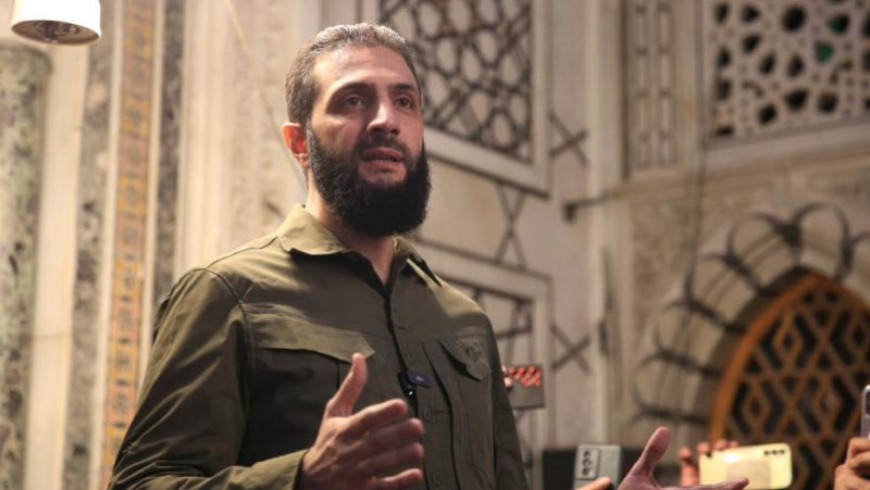Ahmad al-Sharaa, the commander-in-chief of the Military Operations Department, stated that Damascus endured catastrophic conditions during its liberation, with destruction affecting every aspect of the city. This devastation reflects the immense suffering Syrians have faced throughout years of conflict.
In an interview with *Syria TV*, al-Sharaa revealed that ousted former regime president Bashar al-Assad had instructed the governor of the Central Bank to print currency without financial backing. This decision, made by virtue of his position, worsened the economic crisis and deepened the hardships endured by Syrian citizens.
“Leading Syria with a State-Building Mentality”
Al-Sharaa highlighted the dire situation in Syria, calling for carefully crafted plans to address the country’s challenges. He emphasized the importance of gathering and thoroughly analyzing data before taking practical steps to resolve pressing issues.
“Despite the revolution’s victory,” al-Sharaa stressed, “it is crucial to abandon the revolutionary mentality when leading Syria.” He argued that the nation must shift towards building a state founded on law and institutions to achieve lasting stability. He further asserted that Syria’s future depends on transitioning from revolutionary thinking to state-building, rooted in principles of governance and justice.
Al-Sharaa also pledged that the new administration would end the production of Captagon in Syria. He noted that the former regime had transformed the country into a hub for Captagon production, as revealed in international reports following Assad’s downfall.
According to al-Sharaa, the Syrian regime was toppled within just 11 days, following years of meticulous preparation. He described this swift achievement as a testament to the rigorous planning and effort behind the military operations. He also highlighted that major cities were brought under control without triggering mass displacement.
Al-Sharaa detailed the unique challenges the Syrian revolution faced, including internal divisions, factional rivalries, and international interference. These complexities, he said, set the Syrian revolution apart from others worldwide and obstructed the possibility of comprehensive political solutions. As a result, the military option became the only viable path to achieving the revolution’s objectives, despite its inherent difficulties.
Looking ahead, al-Sharaa called for a concerted effort to rebuild Syria based on modern principles that ensure justice and rights for all citizens. He cautioned against repeating the mistakes of the past that had derailed previous attempts to establish stability.
He also criticized the heavy targeting of civilian areas by Russian warplanes and warned of a possible repetition of the Gaza scenario in northern Syria, exacerbating humanitarian challenges.
“Israel’s Claims Are Baseless”
Al-Sharaa dismissed Israel’s recent justifications for its actions in Syria as unfounded. He accused Israel of crossing clear boundaries in its engagement, posing a serious risk of unnecessary regional escalation.
He stressed that Syria’s weakened state, after years of war, leaves it ill-equipped to enter new conflicts. The priority, he said, is reconstruction and stabilization—not involvement in further disputes that could cause additional destruction.
Al-Sharaa called on the international community to act urgently and shoulder its responsibilities in curbing escalation. He underscored the need for respect for Syrian sovereignty and advocated for diplomatic solutions as the only path to lasting security and stability, avoiding reckless military ventures. “We were instruments used by God to secure victory over the former regime, but the effort was a collective one, belonging to all Syrians,” he added.
Iran and Russia
Al-Sharaa criticized Iran’s expansionist agenda, saying that its efforts to use Syria as a platform for regional ambitions posed a significant danger to the country, its neighbors, and the Gulf states. He stated, “We succeeded in ending Iran’s presence in Syria. However, we bear no hostility towards the Iranian people; our issue lies with the policies that harmed our country.”
Al-Sharaa highlighted the Syrian leadership’s careful approach to managing its relationship with Russia. He noted that Syria had avoided provoking Russia, providing an opportunity for reassessment of the relationship in a way that serves mutual interests. He stressed the need for cautious diplomacy in handling international relations during this critical stage.
“The Former Regime Was a Farm, Not a State”
Al-Sharaa condemned the former regime, asserting that it had operated Syria as a personal fiefdom rather than a legitimate state. He revealed the scale of corruption and theft under Assad’s rule, promising that documents exposing these violations against the Syrian people’s resources would soon be published.
He affirmed that the next phase is one of reconstruction and stability, with a focus on rebuilding the nation and improving living conditions for Syrians. “Our immediate priority is to meet the basic needs of the people and work towards a future that is more stable and just,” he concluded.
This article was translated and edited by The Syrian Observer. The Syrian Observer has not verified the content of this story. Responsibility for the information and views set out in this article lies entirely with the author.


